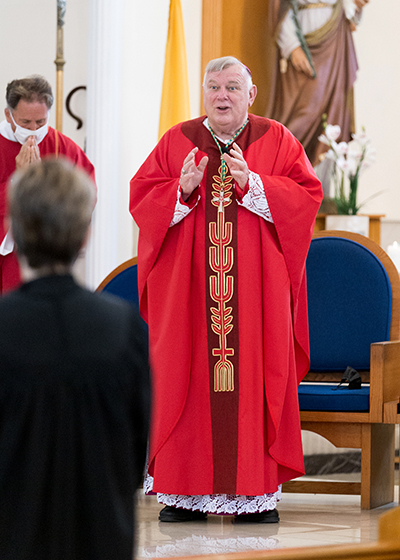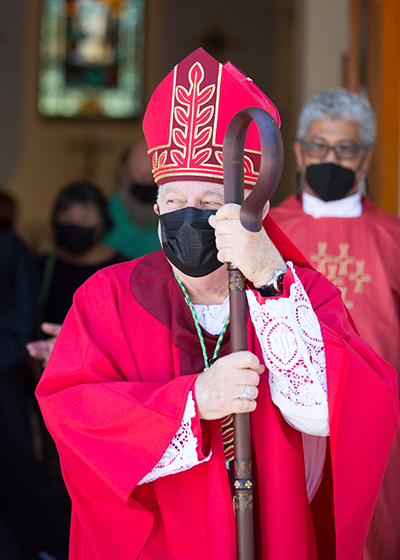By Archbishop Thomas Wenski - The Archdiocese of Miami
Archbishop Thomas Wenski preached this homily during the annual Red Mass for members of the legal profession in Monroe County, which he celebrated at the Basilica of St. Mary Star of the Sea, in Key West, March 5, 2021.
Today’s Gospel parable admits of several interpretations – the easiest one is to read it simply as an explanation of the Old Testament being replaced by the New Testament, the first Chosen People, the Jews, being replaced by a new Israel represented by the Church. We should be careful with interpretations that let us off the hook, as it were. In any case, God’s covenant with the Jewish people is irrevocable. Vatican II says that – and so does St. Paul.
It is true that the Jewish leaders behaved much like the unjust tenants of the parable persecuting the prophets and killing them. When Jesus spoke the parable, they felt its sting – they knew he was talking about them.

Photographer: TOM TRACY | FC
Archbishop Thomas Wenski celebrates the annual Red Mass for legal professionals in the Florida Keys, March 5, 2021, at the Basilica of St. Mary Star of the Sea in Key West.
But it is also true that we, Christians, can behave like those unjust tenants – and because of our own hardness of heart, our pride, our habits of sin, we can and too often do resist the good news of Jesus Christ and thus do not cultivate in the vineyards of our lives the fruits of the Kingdom that God expects of us. That this Gospel is read during Lent suggests that Jesus is speaking not only to the Pharisees and scribes of his day, but also to us.
Lent calls us to a change of heart and a change of mind that is translated into a change of life. Life in Christ means our following him; it means adapting ourselves to his Way, Truth and Life – not as we sometimes seem to think that he should follow us and adapt himself to us.
Our lives are not our own. Our lives belong to the Lord – in that sense our life is the vineyard that God wants us to cultivate – that is, to produce the fruits of his Kingdom: peace, justice, compassion, and mercy.
We do not own ourselves – and so we cannot live our lives as we choose – for like the tenants entrusted with the vineyard we are entrusted with the vineyard of our lives to care for it in a way that best serves God’s purposes. Otherwise, we will, like our first parents, Adam and Eve, think that we can be our own gods.
Today, we gather for this Red Mass – almost one year after COVID-19 intruded into our lives. These past 12 months of a global pandemic, great economic upheaval, social unrest and political divisiveness have reminded us of the fragility of our lives – and that, despite our technologies, we are not as in control of our lives as we sometimes pretend to be. Hopefully, when we emerge on the far side of this pandemic, we will be humbler. In the meantime, we do need to grow in patience.

Photographer: TOM TRACY | FC
Archbishop Thomas Wenski exits the Basilica of St. Mary Star of the Sea in Key West after celebrating the annual Red Mass for legal professionals in the Florida Keys, March 5, 2021.
We have lost our patience with our leaders, our institutions. That loss of patience has generated much anger in our society. But going deeper, much of that anger seen in our streets and expressed in social media really revolves around the argument over “who belongs.” And so, we hear warring slogans: “Black lives matter,” “Blue lives matter,” “All lives matter,” and from those who identify as prolife, “Unborn lives matter.” And they all do matter – but beneath these slogans there is an argument about “Who truly belongs to our society?” And “who is shut out?”
A sense of belonging – of being attached to particular people and places – gives shape to our identity and provides security in which to grow. As human beings we long to belong – to a family, to a community, and to a nation.
And so as Catholics but also as members of the Bar, you can make an important contribution to the arguments that lie beneath the social unrest the besets our society today as it faces the challenges of enduring racism, growing inequality and the intolerance of a “cancel culture.”
Catholic teaching proclaims the dignity of every human being but also acknowledges the reality of sin. Our police forces, our social services agencies, our schools, our courtrooms deal with the consequences of sin every day. Our founders also recognized human sinfulness, which is why they gave us a divided government based on checks and balances. Our nation’s founders built better than they knew – and better than we appreciate today. Their vision of freedom was one of ordered liberties, a vision remarkably congruent with Catholic social thought. St. Thomas Aquinas – the great theologian of the 13th century – would have been very comfortable in the presence of Jefferson, Adams and Monroe.
As Catholics but also as members of the Bar, you can build a natural bridge between the founding principles of our nation and the principles of Catholic social teaching with its understanding of natural law.
Without your contribution and commitment to both Catholic social teaching and our founders’ vision of freedom as “ordered liberties,” our system of justice could devolve to a type of judicial positivism based simply on a common agreement to set aside truth claims about the good – “We hold these truths...” – and to adopt a relativism which would make the practice of law the province of irrational tastes and arbitrary subjective judgments.
Your craft as lawyers and as officers of the court has as its foundation, its reason for being, the principle emblazoned on the façade of the Supreme Court building, “Equal justice under the law.” Equal justice makes possible that belonging – e pluribus unum – in which we as Americans find our identity and the security that enables human flourishing.
May you work to build that “natural bridge” that spans the founding principles of our nation and Catholic social teaching. Work patiently – and with a great measure of humility – for what is at stake is the future of the rule of law in this land of the brave and the home of the free.

